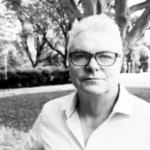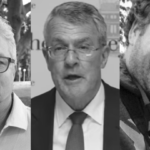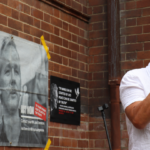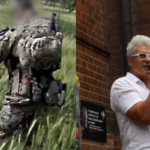McBride’s Appeal Is in Jeopardy, as the Respected Lawyer Needs Finances to Fund It

For his troubles in having exposed the lawless nature of the Australian war effort in Afghanistan mid-last decade, which led to the unchecked perpetration of alleged war crimes by Australian special forces officers, ADF whistleblower David McBride is currently serving a draconian prison sentence, of which he might not be able to appeal, as currently he can’t afford to pay for counsel.
ACT Supreme Court Justice David Mossop sentenced McBride on 14 May this year, to a jaw-dropping 5 years and 8 months prison time, with non-parole set at 2 years and 3 months. And the former military lawyer has been granted the right to appeal his sentence to the ACT Court of Criminal Appeal on 3 March next year.
So, for the last six months, McBride, a hero to countless, has been stewing in the Alexander Maconochie Centre, all because he alerted the ABC to questionable practices involved in this nation’s Afghan war effort, which was information that included the details of alleged multiple war crimes perpetrated by Australian troops that became the subject of 2017’s The Afghan Files.
But as David’s solicitor Eddie Lloyd is currently warning, unless the father-of-two is able to put his appeal to the top court in the capital next March, he’ll have to serve out the entire non-parole period, which currently ends on 13 August 2026, another 21 months away.
As it stands at present, McBride, who’s a respected expert on the law of armed conflict, can’t afford to run the appeal.
Serving time for truth-telling
“This is a public interest case,” Lloyd made clear. “Unfortunately, it’s a David and Goliath battle because he is up against the government, which has spent $2.5 million in prosecuting and gaoling him. They are likely to spend at least the same again opposing the appeal. This is the Commonwealth using taxpayer money to fund their opposition to keep David gaoled.”
“It’s a public interest case, so we are really relying upon the general public to fund this appeal,” the criminal defence solicitor told Sydney Criminal Lawyers.
“We don’t have nearly enough to run an appeal in the ACT Court of Criminal Appeal, and we are asking the public to chip in because this appeal is not just about David McBride, it is about every one of us.”
Australia passed the Public Interest Disclosure Act 2013 (Cth) (PID Act), which is supposed to protect those in the public service who expose corruption for the greater good of the people. But despite this, when David fronted up to the ACT court to argue his public interest defence under the law in October 2022, the authorities blocked his ability to do this via the removal of his evidence.
A similar pattern of events occurred when he subsequently stood trial, as a great swag of his evidence was denied under the guise of national security concerns, which left McBride with no other choice but to plead guilty to three offences in the ACT Supreme Court on 17 November 2023.
McBride pleaded guilty to one count of theft, contrary to section 131.1 of the Criminal Code Act 1995 (Cth), which carries up to 10 years imprisonment, and he also admitted guilt to two counts of unlawfully communicating defence information, contrary to section 73A of the Defence Act 1903 (Cth), which carries, on indictment, “a fine of any amount or imprisonment for any term, or both”.
“He’s missing his daughters. One of them is doing her HSC. He’s missing his community in Bondi. It’s difficult. The days are very long in custody. He has PTSD. People forget he is a veteran, who has served on the frontline. So, he is a vulnerable person in custody,” Lloyd added in respect of her client.
“But he is someone who is cup-half-full all the time. He is such a bright and optimistic man.”
Blowing the whistle as required
As an ADF lawyer, McBride was a respected expert on the rules of engagement, and he also taught the PID Act to soldiers. The complaint McBride initially made internally to his Australian Defence Force seniors, prior to ever going to the press, was in accordance with the provisions set out in the PID Act and it was very specific.
The initial issue that triggered his disclosure was that at the end of 2013, then Chief of the Defence Force David Hurley announced that the rules of engagement needed to change. McBride questioned why the ADF would consider altering these rules, and he was then told that multiple incidents had been occurring over previous years in Afghanistan, which warranted the reforms.
Defence then provided McBride was a series of incident reports supposed to justify the proposal to change the rules. However, the content of these reports didn’t convey why these incidents did provide a rationale for change. And when David raised this with his superiors, he was told that additional legal advice had further supported the reform, and he was provided with a copy of it.
At the same time, the Australian Defence Force Investigative Service (ADFIS) was intervening to investigate these specific incidents in Afghanistan, even though, according to McBride, the criminal law standard of reasonable suspicion had not been met in respect of these cases. So, he raised concerns about these unlawful investigations, as is required of any Australian lawyer.
And released in November 2020, the Australian government-commissioned Brereton report into Australian Defence Force operations in Afghanistan uncovered evidence that saw it recommend the investigation of 19 ADF personnel in respect of 23 incidents that involved 39 alleged murders of Afghan civilians and prisoners of war.
Appealing his politicised punishment
“So, we’re running a conviction and severity appeal – that the sentence was too severe,” Lloyd continued. “There are some very obvious areas that give us ground to appeal the severity of the sentence.”
“We are also importantly going to appeal the conviction, as Dave was really compelled and forced to plead guilty at the eleventh hour after Judge Mossop determined the question of duty, that his duty was not to do anything but obey,” the criminal defence lawyer added.
McBride had hoped to run a public interest defence, in which he would convey that it was his duty as an ADF solider and a solicitor, who has taken an oath to uphold his duties in both these positions, to blow the whistle in the manner that he did. And as a lawyer he has legislated ethical obligations that he must adhere to.
“At the end of the day, it’s just about a man doing his job as a lawyer, as an officer of the court, and a solider of the country, acting in the public interest and that got him gaoled,” Lloyd said in summing up.
“This is about our freedoms in the workplace, to feel safe in exercising them and to not feel intimidated with a gaol term,” the lawyer ended.







